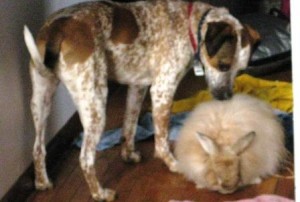We have three Puggles who live across the street and drive my dog Loki crazy. They are barkers and howlers (the Beagle part of the Puggle), and Loki just can’t resist answering. Loudly, intensely and bark for bark. He just can’t seem to help himself, and sometimes, he will respond to my shushing him, and sometimes not. Sometimes I have to stand right in front of him and interrupt him to focus on me, sometimes I have to drag him away from the window or door. That, by the way, is no small feat since he is 75 pounds of muscle, tense, agitated muscle when he is “puggling.”
 Loki has some other more endearing qualities, like his job as a bed warmer (which I appreciate way more in the winter than the humid NJ summer). He jumps up and then circles a few times before plopping down right next to my legs with a big contented sigh. Here’s the really interesting part: if the Puggles start barking, the most he does is lift his head, look back at me, and then lays his head back down with another contented sigh. The dog owner sighs contentedly also.
Loki has some other more endearing qualities, like his job as a bed warmer (which I appreciate way more in the winter than the humid NJ summer). He jumps up and then circles a few times before plopping down right next to my legs with a big contented sigh. Here’s the really interesting part: if the Puggles start barking, the most he does is lift his head, look back at me, and then lays his head back down with another contented sigh. The dog owner sighs contentedly also.
The hypnotherapist, addictions counselor and recovery coach, however, sees a metaphor about dealing with urges and springs into action! Most people understand what an urge or craving is. It leads to following behaviors that may be totally irresistible in the moment, and for the most part, are occasional splurges. For alcoholics and for addicts, whether they are addicted to substances or what we call the “process addictions”, urges can lead to more dire consequences. An important goal of “recovery” and a relapse prevention plan is learning to deal with urges to use whatever the substance or process is. This is much easier said than done, of course.
The beginning of this process is to identify other comforting activities and behaviors. This takes some thinking and work for many people seeking recovery, since nothing feels as good as indulging in the addictive behaviors. Nothing. Ever. Sorry about that, but nothing will feel as good as drinking if you are an alcoholic; nothing is going to get you to the same high of your drug of choice. If you are a gambler, nothing will take the place of betting. And so on. But as you learn what other activities feel good, and you learn to accept this level of feeling good which doesn’t involve dire consequences or constantly chasing the high, your life gets better. Often, the urges dissipate. Really.
It’s a process, not an event. It takes time and mindfulness and commitment. Many addicts also find that not feeding into urges, having other activities to focus on improves their self-esteem, as well as the quality of their work, relationships and health.
So, what do you like to do, besides use your drug of choice?

